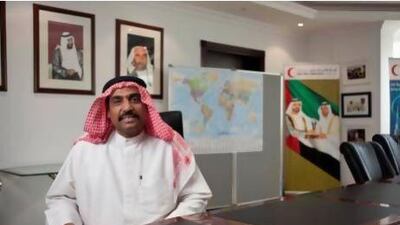DUBAI // Emirates Red Crescent is to double its budget for assistance next year, and says more people will benefit from its charitable work.
Widows, divorcees, large needy families, orphans, and the disabled and their families are among those expected to receive more help from the organisation.
But there are no plans to increase payments for education or health.
Mohammed Al Zaroni, manager of the Red Crescent's Dubai branch, said some needy families would receive double the amount they received now.
"This will help immensely in lowering their burdens," Mr Al Zaroni said. "If a lot of countries have exceeded in technology and health, the UAE has exceeded in its humanitarian aid."
He said the Red Crescent was looking into 6,000 needy cases in Dubai, two thirds of whom were Emirati.
While the Red Crescent does not turn away any needy person that comes to it, regardless of religion or nationality, Mr Al Zaroni said the group focused on those working for government bodies, as they "were serving the country", and labourers with low salaries.
The Red Crescent in Dubai is open from 8am to 2pm on Sundays and Tuesdays for all nationalities, and on Mondays for Emiratis.
On Wednesdays, he said, field visits were made and families were called on.
Thursday was set aside for internal office work.
"We do not have a set minimum for families to get benefits," Mr Al Zaroni said. "But say you live in Dubai on a Dh5,000 salary and have children, that is hard."
Since the UAE this year relaxed its rules on hepatitis tests for those seeking work permits, the Red Crescent has been the first to offer treatment for labourers with Hepatitis C.
"Most of the cases we see are of Egyptians and Pakistanis," Mr Al Zaroni said. "They need a Dh26,000 course to be cured. In one month we spend Dh430,000 on treatment. So far we have helped 32 people."
He said treatment was initially given directly to labourers but that created a black market. Now, treatment is carried out at the authority's hospital in Sharjah.
Another challenge has been people who register at several branches to receive aid more than once.
Starting this year, all 10 branches of the Emirates Red Crescent were linked electronically to battle fraud.
Some recipients were also using forged papers to prove low salaries or high house rents. Now an Emirates ID is required to register for aid.
"When we did the joint database we found that there was manipulation, which isn't good since they are taking money that could help someone else," Mr Al Zaroni said.
The agency also visits workplaces and homes.
"If they need assistance for education, we make sure the child is enrolled in the school and attending," he said. "With medical assistance, we verify everything."
But the biggest challenge is inflation. The economic crisis affected the agency, but did not lead to fewer donors.
"It happened and people donated more," Mr Al Zaroni said. "I'm not sure why. Possibly they believed it would improve their situation."
Emirates Red Crescent has given out Dh2 billion in the UAE since it was formed in 1983.

